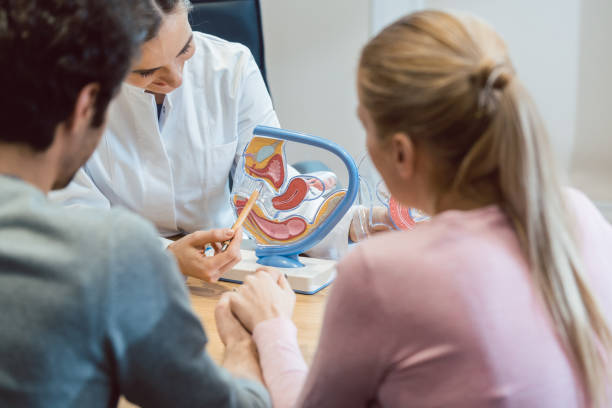Best Infertility Hospital in Punjab
The fertility specialists at Gomti Thapar Hospital, the best infertility hospital in Punjab, perform both male and female infertility diagnosis and testing to determine factors which affect the fertility of male and female partners.
The main test for infertility mentions below-:
Female Infertility Tests
- Cycle Day 2-3 FSH and Estradiol: It helps to understand the hormone functions in the body to comprehend FSH level testing. The right time must be chosen for FSH testing. The typical range fluctuates day by day because FSH levels fluctuate throughout the menstrual cycle. You must get the blood test on day 3 of your menstrual cycle to do basic fertility testing and assess ovarian reserves.
- Mid-Cycle Ultrasound: On or around Day 13 of your cycle, a mid-cycle ultrasound will be performed.
- Hysterosalpingogram (HSG): A procedure known as hysterosalpingography, or HSG, uses X-rays to reveal the interior structure of the uterus and determine if the fallopian tubes are obstructed.
- Sono-Hysterogram or Hysteroscopy: A sonohysterogram is less intrusive than other surgical procedures. It enables your doctor to view your uterus. It gives precise images of the internal organs to determine the source of problems.
- Anti-Mullerian Hormone (AMH): The capacity of a woman to create eggs that can be fertilized for pregnancy is assessed with an AMH test. The quantity decreases as a woman ages. AMH levels can help determine how many fertile egg cells a woman still has.
- Prolactin: The most frequent purposes for a prolactin level test are: Diagnosing a prolactinoma (a type of tumour of the pituitary gland) and identifying the root cause of a woman’s irregular menstruation and/or infertility.
- Fragile X: A blood test that analyses a person’s DNA can diagnose FXS. A physician or genetic counsellor can order the test. Testing can also be done to look for variations in the gene that may result in illnesses linked to fragile X.
- Karyotyping (Chromosome test done on a blood sample): A test called karyotyping checks the chromosomes in a sample of cells. This test can assist in determining whether an illness or disease is brought on by hereditary issues.
- TSH: The term TSH refers to thyroid stimulating hormone. A blood test called a TSH test assesses this hormone. TSH readings that are abnormally high or low might indicate a thyroid issue.
- Laparoscopic (intra-pelvic surgery): Surgery to inspect the pelvic organs is known as a laparoscopy. Additionally, the operation is utilised to treat several pelvic organ problems.
- Testosterone, 17-Hydroxy-Progesterone, Fasting Blood Sugar, Insulin (For Polycystic Ovarian Syndrome patients): A hormone generated by the adrenal glands that are involved in the synthesis of the stress hormone cortisol is found by this blood test, also known as 17-OHP. A different medical disorder that might resemble PCOS symptoms is late-onset congenital adrenal hyperplasia, and the test will perform to identify whether it is present.
Male Infertility Tests:
- Semen Analysis: A lab test called a semen analysis measures sperm count, motility, morphology, and other factors. It is a fertility test that may also determine whether a vasectomy was effective.
- Hormonal Tests: FSH, LH, Testosterone, Prolactin, Estradiol: Tests for the hormone’s testosterone and FSH (follicle-stimulating hormone) assess the overall hormonal balance and the precise condition of sperm production.
- Karyotype (Chromosome test done on a blood sample): A karyotype identifies the underlying reason for infertility. If there is a clinical suspicion of a chromosomal abnormality, a karyotype is recommended.
- Y-Chromosome micro-deletion DNA analysis (Blood test): The Y chromosome microdeletion test aids in locating the Y chromosome missing genes, which may be common in males with azoospermia. This test aids in locating one of the key conditions that might make a man infertile.
- Sperm Chromatin Separation Assay (SCSA) for DNA fragmentation (Sperm test): With the use of the new diagnostic method called the sperm chromatin structure assay (SCSA), sperm samples with significant DNA fragmentation can be found (small breaks in the sperm chromosomes).



